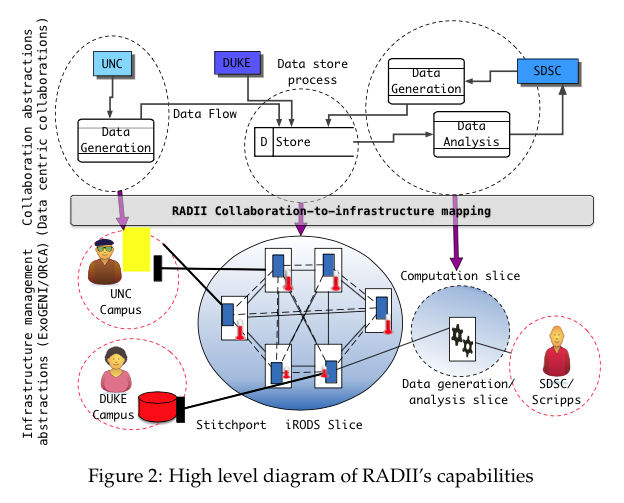Overview
Current efforts to enable data-driven science either look at data management issues, such as data curation and data preservation, or resource management issues, such as developing network mechanisms to speed up data transfers. RADII (for Resource Aware Data-centric collaborative Infrastructure) builds on the principle that a comprehensive approach which integrates data and resource management from the ground up is crucial to developing a cyberinfrastructure that can support data-centric research in a productive and extensible fashion. The RADII project team will develop tools and approaches that allow scientists to easily map collaborative data-driven activities onto dynamically configurable cloud infrastructure.
RENCI’s Role
The RENCI team will integrate two technologies (the iRODS data-grid system for managing distributed data sets and the ORCA control framework) into a novel software infrastructure. This infrastructure will allow scientists to achieve three main goals: 1) represent data-centric collaborations using standard modeling mechanisms; 2) map data processes, computations, storage, and organizational entities of the collaboration onto the physical infrastructure with the ease of a button click; and 3) provision and de-provision infrastructure dynamically throughout the lifecycle of the collaboration.
Partners at Duke University and the University of California at San Diego will provide specific use cases in order to test the functionality of the final infrastructure.
Project Team
- Ilya Baldin (Principal Investigator)
- Claris Castillo (Principal Investigator)
- Shu Huang
- Tahsin Kabir
- Anirban Mandal
- Arcot Rajasekar
- Paul Ruth
- Charles Schmitt (Principal Investigator)
- Yufeng Xin
Partners
Funding
National Science Foundation, Campus Cyberinfrastructure – Infrastructure, Innovation and Engineering Program (CC*IIE)


